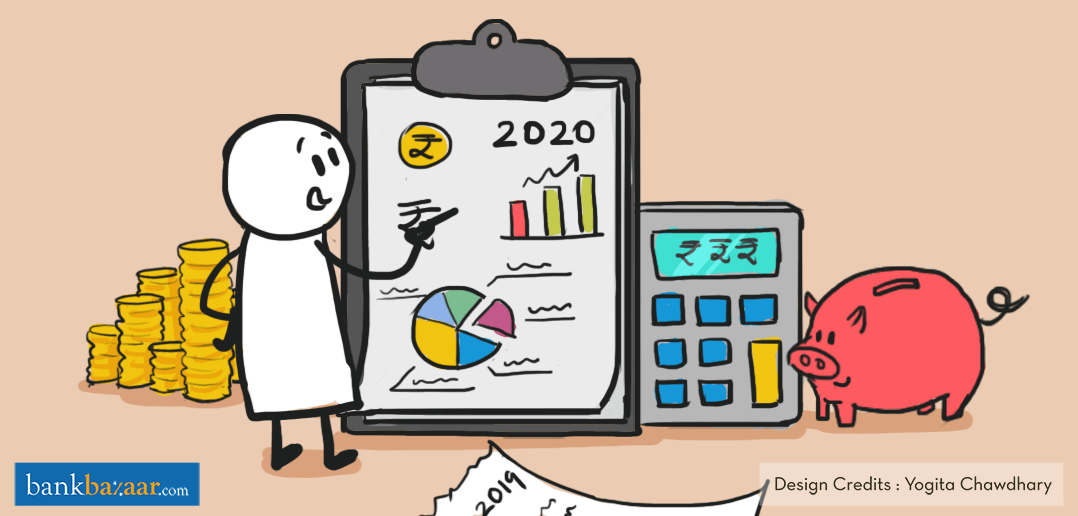According to FM Nirmala Sitharaman, Budget 2020 has included provisions that would translate to more income and purchasing power for tax-paying citizens. From a personal finance view, here are five key changes that you should know about.

On the 1st of February, 2020, our Finance Minister (FM) Nirmala Sitharaman announced the Budget for FY 2020-21. Being one of the most anticipated events of the year, the entire nation was anxiously waiting for the announcement, hoping that this year’s Budget will bring some relief in terms of more savings, easier and cheaper loans and more.
Check out great deals on Credit Cards and Loans
So, did the Budget deliver up to expectations? Well, according to FM Nirmala Sitharaman, Budget 2020 has included provisions that would translate to more income and purchasing power for tax-paying citizens. From a personal finance view, here are five key changes that you should know about:
New Tax Structure
With the aim to help taxpayers retain more of their hard-earned money in their hands, a new tax rate structure was introduced in this year’s Budget. However, this doesn’t mean that the old tax structure ceases to exist. Rather it has been left to us to choose whether we want to adopt the new tax structure or stick with the old one. For those opting for the new structure, the catch is that the existing tax deduction means, which includes deductions under 80C, standard deduction, house rent allowance (HRA), etc., will not be applicable.
Here’s how the new structure looks as compared to the old one.
| Income | Old Tax Rate | New Tax Rate |
| Up to Rs. 2.5L | Nil | Nil |
| Rs. 2.5L – 5L | 5% | 5% |
| Rs. 5L – 7.5L | 20% | 10% |
| Rs. 7.5L – 10L | 20% | 15% |
| Rs. 10L – 12.5L | 30% | 20% |
| Rs. 12.5L – 15L | 30% | 25% |
| Rs. 15L & above | 30% | 30% |
P.S. The Budget retains the full tax exemption under Sec 87A for those earning up to Rs. 5L p.a. as well as the applicable tax surcharge rates for those earning above Rs. 50L.
Additional Reading: Tax-Saving Investments to Grow Your Wealth
Bye, Dividend Distribution Tax (DDT)
Unlike earlier, when the dividend income from shares and Mutual Funds (MFs) were taxed in the hands of the companies and Mutual Fund houses, the responsibility has now been shifted to the recipients. This big move is supposed to give the much-needed push to investments, boosting market sentiment and upping the popularity of Indian equities. Market experts considered DDT as a surrogate tax which hindered the flow of Foreign Direct Investments (FDIs) into the country.
Higher Insurance Cover For Bank Deposits
Post the PMC crisis, the RBI had announced a bank deposit insurance cover of Rs. 1 lakh per depositor in case of failure of the bank. This cover has now been increased to Rs. 5 lakhs. All bank deposit types – savings, fixed and recurring – are covered by this scheme. They are insured by the Deposit Insurance and Credit Guarantee Corporation (DICGC), which is a subsidiary of the RBI.
However, do keep in mind that if you maintain multiple accounts in the same bank, probably at different branches, these will all be clubbed as one and Rs. 5 lakhs will be applicable on the aggregate amount. But, if you accounts in different banks, you’ll be eligible for Rs. 5 lakhs for each of those account. Also, the cover is applicable only in case of unlikely bank failure which sees the bank closing operations. It is not applicable if the bank is just going through tough times.
Retirement Funds To Be Taxed
Yes! Employers’ contributions towards NPS (National Pension Scheme), PF (Provident Fund) and superannuation funds will be capped at Rs. 7.5 lakhs in a year, effective 1st April, 2021. This could have a negative impact with the salaried seeing a reduction in take-home salaried due to higher taxable amount.
Earlier employer contributions to NPS and PF were exempt from tax.
Cheaper Homes
From the earlier 5% discount, the new Budget has put forth a new proposal to real estate developers which allows them to sell their properties at a 10% discount from the circle rate. This means homebuyers can now get cheaper rates on housing.
Additional Reading: Union Budget 2020 Highlights
So, what’s opinion on this year’s Budget? Let us know in the comments section below. Also, if you’re looking for any financial help, BankBazaar.com has got your back. Just hit the link below to start exploring.